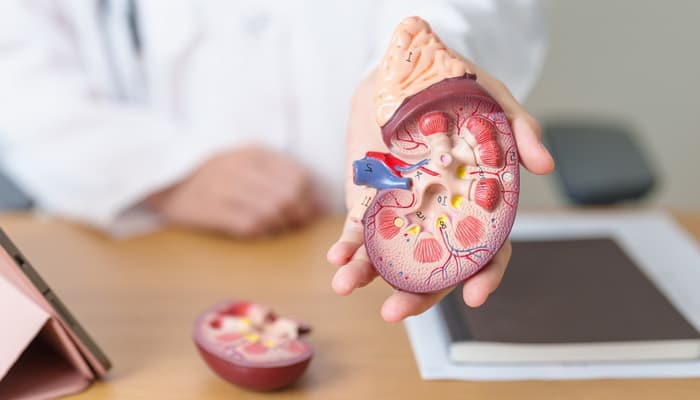Зміст
Nephritis is an inflammation of the glomeruli or other kidney tissue. It can be chronic or acute. However, each type of nephritis can lead to more serious health complications, so it’s worth knowing what the symptoms of nephritis are, where it can come from, and how to treat the condition.
Jade – reasons
Most often, nephritis occurs as a result of a bacterial infection, when microorganisms enter the body through the urinary tract (particularly the kidneys) and develop there. Autoimmune diseases (such as systemic lupus erythematosus) can also be detrimental because they can lead to nephritis because they weaken the body’s defenses and can cause the body to attack its own tissue (in this case, kidney tissue). Kidney inflammation can also occur as a result of organ damage caused by toxins or drugs.
Nephritis – symptoms

The most characteristic symptoms of nephritis are:
- Blood in urine
- Fatigue,
- Increased body temperature, chills,
- Pain when urinating and general pain in the lumbar region (usually on both sides),
- Frequent urge to urinate.
Glomerulonephritis
Glomerular nephropathy, also known as glomerular nephropathy, is a type of kidney inflammation that affects structures called glomeruli. The glomeruli are very small structures in the kidneys that filter blood and produce urine. Glomerulonephritis can have various causes, and one of the main pathological mechanisms is damage to the glomeruli.
Pyelonephritis
This is an upper urinary tract infection that affects one or both kidneys. This disease is characterized by inflammation of the renal parenchyma and interglomerular tissue. It is often caused by bacteria such as E. coli.
Interstitial nephritis
This condition is similar to glomerulonephritis because the disease causes inflammation of the inner tissue of the kidneys, including the glomeruli.
Bacterial nephritis
Most often, the renal pelvis and/or renal parenchyma are affected. This is a disease in which bacteria enter the urine and excretory system, for example through the urethra and bladder. The infection causes inflammation in the kidney, which impairs its function. The main direction of treatment for bacterial nephritis is the prescription of properly selected antibiotics.
Chronic nephritis
This is a situation in which inflammation in the kidneys gradually increases. This is a process that can take many years, and symptoms in the initial stages are often mild or unnoticeable, meaning the disease is often diagnosed later (or even too late) when the kidneys have already been significantly damaged. As the disease progresses, general symptoms may appear, including: fatigue, loss of appetite, trouble concentrating, swelling, hypertension, and changes in the amount and appearance of urine. Such symptoms should prompt us to get blood and urine tests.
Acute jade
Unlike chronic nephritis, acute nephritis develops suddenly and is often very intense. Most often, this can occur as a result of injury or infection. It is important to quickly contact a specialist if alarming symptoms appear, such as severe pain, changes in appearance or amount of urine. Untreated acute kidney disease can lead to serious complications such as kidney abscess or organ damage.
Jade – treatment
Treatment of nephritis can be divided into etiotropic and symptomatic. For example, if kidney inflammation is a consequence of a bacterial infection, it is necessary to use antibiotics – this is etiotropic treatment. Symptomatic treatment is aimed at improving the patient’s comfort and may include, for example, the administration of analgesics and antipyretics. However, it must be emphasized that the issue of treatment is very individual and always requires consultation with a specialist.
What antibiotic for nephritis?
The most commonly used antibiotics for nephritis are:
- Ciprofloxacin,
- levofloxacin,
- Cephalosporins,
- Trimethoprim, sulfamethoxazole.
The choice of drug depends on the decision of the specialist.
Is jade dangerous?
Inadequately (or untreated) nephritis can lead to dangerous complications. Namely, the infection can spread to other systems of the body, which can even lead to sepsis. Additionally, untreated kidney inflammation can cause structural damage to the organ, which can even lead to kidney failure. This is why it is so important to pay attention to symptoms that concern us and take action as soon as possible if we are concerned about our health.
Jade – how long does it last?
The duration of the disease depends, of course, on many factors, so it is difficult to determine how long nephritis lasts. The following factors have a significant influence: the type of infection, the effectiveness of treatment, possible complications and general health.








